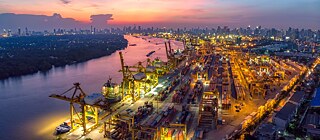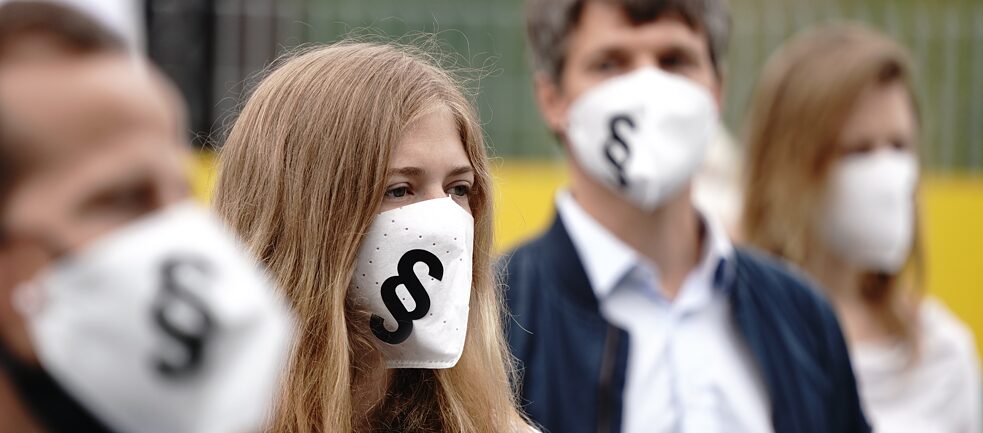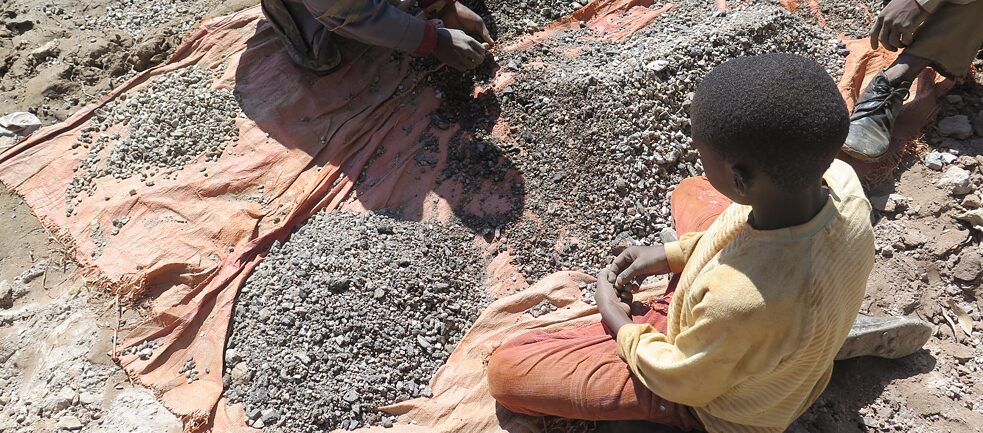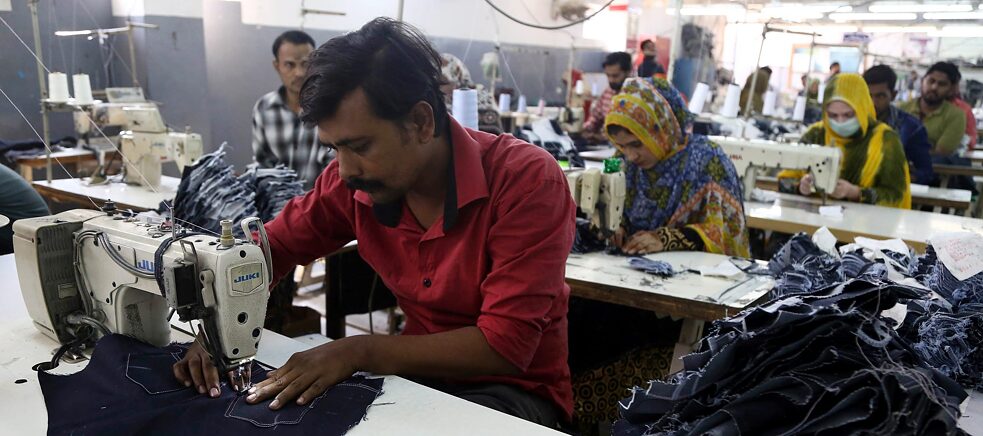Supply Chain Act Holding Companies Responsible

For many outside Europe, working for a supplier of German companies means exploitation, poor wages, and a lack of labour rights. Starting in 2023, a new law will take effect to punish human rights violations taking place in German supply chains. But can it really bring the needed change?
Muhammad Hanif is one of the countless people around the world who has worked as part of a German company supply chain. He operated a sewing machine at the All Enterprises factory in Pakistan, which produced jeans for discount clothing retailer KiK. On September 11, 2012, the building exploded into flames. Hanif survived only because he and his co-workers ripped an air conditioning unit out of the wall and jumped out through the hole. 258 people died. Survivors and victims’ families filed a case against German KiK, demanding the company be held partly responsible for the high death toll. But the question of whether a German corporation could be held liable for a supplier’s compliance with human rights due diligence was never settled in court: Judges later dropped the case when the statute of limitations expired.
Nine years later, the situation has changed, and some progress has been made toward resolving this question. In future, German companies will have to share responsibility for ensuring that their suppliers uphold human rights. After years of debate, the German government passed the Supply Chain Due Diligence Act in the summer of 2021. It addresses human rights violations in the production of goods or parts for “Made in Germany” products. The act will enter into force in 2023, initially for companies with more than 3,000 employees, and in the following year for companies with more than 1,000 employees. This is the German government’s attempt to prevent serious human rights violations such as child and forced labour, contribute to safer working conditions, and support the unionisation of workers.
 Society’s awareness has changed: September 2020 demonstration for a supply chain law in front of the Federal Chancellery.
| Photo (detail): © picture alliance/dpa/Kay Nietfeld
Other countries have already passed similar legislation making companies responsible for due diligence in their supply chains, including Great Britain, France, the Netherlands, Australia, and the US state of California. This has been in response to problems with the global division of labour resulting from corporations’ increasing fragmentation of their business operations into value chains since the 1980s. Corporations retain the areas with the highest profit margins, such as research and development and marketing, while sometimes completely outsourcing production to supply chains. “The further east you go, the more the cost is low,” seems to be the corporate buyer’s rhyming mantra.
Society’s awareness has changed: September 2020 demonstration for a supply chain law in front of the Federal Chancellery.
| Photo (detail): © picture alliance/dpa/Kay Nietfeld
Other countries have already passed similar legislation making companies responsible for due diligence in their supply chains, including Great Britain, France, the Netherlands, Australia, and the US state of California. This has been in response to problems with the global division of labour resulting from corporations’ increasing fragmentation of their business operations into value chains since the 1980s. Corporations retain the areas with the highest profit margins, such as research and development and marketing, while sometimes completely outsourcing production to supply chains. “The further east you go, the more the cost is low,” seems to be the corporate buyer’s rhyming mantra.
Wages too Low to Meet Even Basic Needs
Today, the world’s 50 largest corporations have outsourced 94 percent of their activities to supply chains abroad, which has paid off for owners and shareholders: From 1980 until the start of the pandemic, the profits of multinational corporations more than doubled on average, largely due to this division of labour. Wages are lower in the Global South, as are environmental and social standards. So European companies have widely outsourced those production processes that involve a large number of people or generate a lot of CO2.
While companies and workers in low-wage countries have also benefited from this development, it is equally apparent that many who work in these branching supply chains – such as seamstresses, miners, and pickers – remain locked in poverty. Even serious human rights abuses are still commonplace in supply chains, including child labour in cocoa farming in West Africa and forced labour in cotton production in China. And many work incredibly hard in supply chains for wages that do not even cover their basic needs.
Primary responsibility should lie with the governments of low-wage countries, but they often feel their hands are tied because they fear a drop in business and jobs. On the other hand, for decades the governments of industrialized countries have simply assumed that companies would address the problems themselves and voluntarily. Some companies have taken positive steps, but overall the approach has failed miserably. In Germany, not even one in five companies surveyed met their human rights due diligence obligations with their suppliers.
 Human rights abuses such as child and forced labour are still commonplace in many supply chains: Children work in a cobalt mine in Congo. Cobalt is used to make batteries for smartphones and electric cars, among other things.
| Photo (detail): © picture alliance / dpa / Thomas Coombes
Human rights abuses such as child and forced labour are still commonplace in many supply chains: Children work in a cobalt mine in Congo. Cobalt is used to make batteries for smartphones and electric cars, among other things.
| Photo (detail): © picture alliance / dpa / Thomas Coombes
A Tentative but Important Step
At first glance, is appears the German legislation lacks teeth. After all, it only applies to one in a thousand companies, given that there are only around 4,800 companies with enough employees. Yet the risks do not automatically correspond to a company’s size – smaller firms can be involved in risky businesses involving human rights violations too.
The law also stipulates that companies are only required to identify risks for their direct suppliers, and not for their indirect suppliers, that is the suppliers’ suppliers. This may have some effect in some industries, such as fashion brands that buy directly from garment factories in Asia. But it makes little sense if the direct suppliers are based in Germany, as is often the case in the automotive industry.
According to the Supply Chain Act, companies are only forced to intervene with their indirect suppliers if they have substantial knowledge of human rights problems in their supply chains. It will be interesting to see when this statue applies, something German courts will presumably need to clarify one day. The impact would have been greater if – as Development Minister Gerd Müller (CSU) originally envisioned – the law established civil liability for human rights violations, like France’s duty of vigilance law. But this idea was scrapped following massive pressure from large segments of the business community. This means those affected by human rights violations in German company supply chains will still only be able to sue in the German courts under the laws of their home country. This makes the process complicated and costly, which is why it has almost never happened so far. However, non-governmental organizations and trade unions will be allowed to file lawsuits on behalf of those affected in the future – a bit of progress at least. In addition, the Federal Office for Economic Affairs and Export Control (BAFA) will monitor whether companies are meeting their obligations and can demand the necessary documentation from companies. If companies fail to meet their obligations, the BAFA can impose fines or exclude them from public contracts.
The new law only covers environmental aspects if they are related to human rights violations, such as when workers get sick from handling toxic chemicals. The law also has limited applicability to violations of two specific international environmental and health agreements: the Minamata Convention on Mercury and the Stockholm Convention on Persistent Organic Pollutants. Policymakers did not address issues like species extinction, large-scale destruction of forests and soils, and global warming, leaving environmental organisations extremely disappointed.
The fact that this law was passed at all is in part down to Germany’s changing social climate. Nine out of ten German citizens want companies to consider human rights when doing business abroad. Scandals such as the collapse of the Rana Plaza textile factory in Bangladesh or the fire at the Ali Enterprises factory have contributed to the change in awareness – as have people like Muhammad Hanif, who are spreading the word about how dangerous it can be to work in the supply chains of German companies.
 According to the Pakistani government, the textile industry is the country’s most important industry and accounts for nearly 60 percent of all the country’s exports: Workers at a garment factory in Karachi 2020.
| Photo (detail): © picture alliance / Xinhua News Agency / Stringer
According to the Pakistani government, the textile industry is the country’s most important industry and accounts for nearly 60 percent of all the country’s exports: Workers at a garment factory in Karachi 2020.
| Photo (detail): © picture alliance / Xinhua News Agency / Stringer
0 Comments